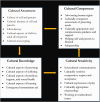Empowering refugee families in transit: the development of a culturally competent and compassionate training and support package
- PMID: 35813174
- PMCID: PMC9264421
- DOI: 10.1177/17449871211018736
Empowering refugee families in transit: the development of a culturally competent and compassionate training and support package
Abstract
Background: Refugee parents who fled conflicts suffered violence and traumas and face huge challenges in supporting the health and welfare of their children while in transit.
Aims: To describe the development of a culturally competent and compassionate training and support package (TSP) for nurses, social and health care workers and volunteers, with a focus on parenting needs among unsettled refugees fleeing conflict.
Methods: The multi-method approach included: a scoping review covering parenting needs of refugees fleeing conflict zones; collection of stories from refugee parents, healthcare workers and volunteers via a mobile application; discussions between team members; a piloted and evaluated curriculum.
Results: High levels of family distress and deterioration of parental identity were identified. Informed by these results, the curriculum is articulated along 20 bite-sized learning units, covering four age stages of childhood as well as targeting adults' well-being. Pilot training was evaluated positively, confirming feasibility and usefulness of the TSP.
Conclusions: Unsettled refugee parents fleeing conflicts face psycho-social and practical difficulties negatively affecting their parenting skills. The care workforce should be trained in order to provide culturally competent and compassionate support to help these families. Open access digital platforms are promising as autodidactic and self-help tools among hard-to-reach populations.
Keywords: compassionate care; culture; mental health; mobility; multi-methods; parenting/families; practice development; public and patient involvement; violence.
© The Author(s) 2021.
Conflict of interest statement
Declaration of conflicting interests: The author(s) declared no potential conflicts of interest with respect to the research, authorship and/or publication of this article.
Figures





Similar articles
-
Graphic Paper: Empowering refugee families in transit: the development of a culturally competent and compassionate training and support package.J Res Nurs. 2024 Aug;29(4-5):285-289. doi: 10.1177/17449871241258830. Epub 2024 Sep 13. J Res Nurs. 2024. PMID: 39291223 Free PMC article.
-
Commentary: Empowering refugee families in transit: the development of a culturally competent and compassionate training and support package.J Res Nurs. 2022 May;27(3):215-216. doi: 10.1177/17449871211019060. Epub 2021 Nov 15. J Res Nurs. 2022. PMID: 35813170 Free PMC article. No abstract available.
-
Optimising refugee children's health/wellbeing in preparation for primary and secondary school: a qualitative inquiry.BMC Public Health. 2019 Jun 27;19(1):812. doi: 10.1186/s12889-019-7183-5. BMC Public Health. 2019. PMID: 31242897 Free PMC article.
-
An undergraduate medical education framework for refugee and migrant health: Curriculum development and conceptual approaches.BMC Med Educ. 2022 May 16;22(1):374. doi: 10.1186/s12909-022-03413-8. BMC Med Educ. 2022. PMID: 35578195 Free PMC article. Review.
-
The culture, mental health and psychosocial wellbeing of Rohingya refugees: a systematic review.Epidemiol Psychiatr Sci. 2019 Oct;28(5):489-494. doi: 10.1017/S2045796019000192. Epub 2019 Apr 22. Epidemiol Psychiatr Sci. 2019. PMID: 31006421 Free PMC article.
Cited by
-
Editorial.J Res Nurs. 2023 Dec;28(8):563-564. doi: 10.1177/17449871231214765. Epub 2023 Dec 27. J Res Nurs. 2023. PMID: 38162713 Free PMC article. No abstract available.
-
Lived experiences of migrant and refugee parents: Challenges encountered during their journey and settlement in Europe.J Migr Health. 2024 Dec 24;11:100294. doi: 10.1016/j.jmh.2024.100294. eCollection 2025. J Migr Health. 2024. PMID: 39834380 Free PMC article.
-
Exploring the Impact of Family Separation on Refugee Mental Health: A Systematic Review and Meta-narrative Analysis.Psychiatr Q. 2023 Mar;94(1):61-77. doi: 10.1007/s11126-022-10013-8. Epub 2023 Jan 24. Psychiatr Q. 2023. PMID: 36690848
References
-
- Arksey H and O’Malley L (2005) Scoping studies: Towards a methodological framework. International Journal of Social Research Methodology, 10.1080/1364557032000119616, 8(1): 19–32.
-
- Bock JG, Haque Z, McMahon KA. (2020) Displaced and dismayed: How ICTs are helping refugees and migrants, and how we can do better. Information Technology for Development 26(4): 1–22. 10.1080/02681102.2020.1727827 . - DOI
-
- Braun V, Clarke V. (2006) Using thematic analysis in psychology. Qualitative Research in Psychology 3(2): 77–101. 10.1191/1478088706qp063oa . - DOI
LinkOut - more resources
Full Text Sources
Miscellaneous
